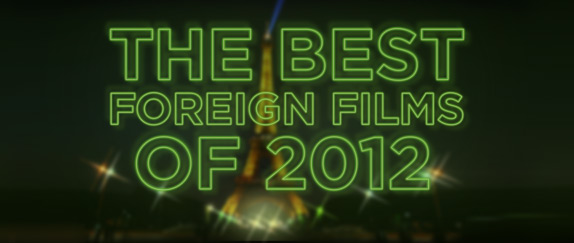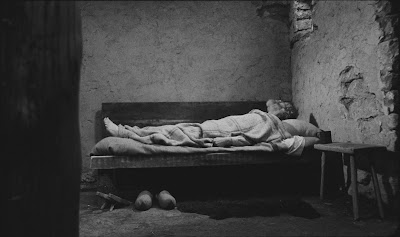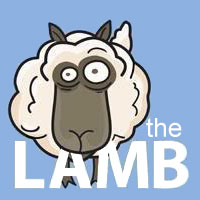

Genre: Drama
Director: Béla Tarr
Starring: János Derzsi, Erika Bók
Language: Hungarian
Duration: 146 min.
Summary:
"In Turin on 3rd January, 1889, Friedrich Nietzsche
steps out of the doorway of number six, Via Carlo Albert. Not far from
him, the driver of a hansom cab is having trouble with a stubborn horse.
Despite all his urging, the horse refuses to move, whereupon the driver
loses his patience and takes his whip to it. Nietzsche comes up to the
throng and puts an end to the brutal scene, throwing his arms around the
horse’s neck, sobbing. His landlord takes him home, he lies motionless
and silent for two days on a divan until he mutters the obligatory last
words, and lives for another ten years, silent and demented, cared for
by his mother and sisters. We do not know what happened to the horse.”
The Turin Horse is a film directed by Béla Tarr, co-written by long time collaborator László Krasznahorkai. It premiered at the 2011 Berlin International Film Festival winning the Jury Grand Prix Silver Bear award. It is also Hungary's official submission to the 84th (2012) Academy Awards Best Foreign Language Film category.
Those familiar with Tarr's work will not be surprised by the films opening. After the brief narrated introduction above, he again presents us with an initial scene that evokes a state of mind rather than the beginning of a story. A beautifully filmed tracking shot, in his trademark black and white, of an old man driving a plodding carriage horse through clouds of dust blown up by a windstorm. Mihály Vig's score is the only thing we hear, a haunting stringed dirge that heralds impending doom.
What follows is a thorough philosophical examination of the next six days after the events in the summary, told from the point of view of the man (János Derzsi), his daughter (Erika Bók), and the horse. It is minimalistic even for a Tarr film, save for two very brief scenes there is practically no dialogue and the only characters we see are the father and daughter. They live in a decrepit farmhouse in the middle of nowhere, where a relentless gale can be heard and seen howling and battering everything in its path.
No effort is made to form a narrative. The immaculately framed images on display are the daily tasks and struggles required just to survive. Cooking a meager meal consisting of a single boiled potato each, cleaning the stables, chopping wood for the stove, dressing and undressing in a half dozen layers to stave off the elements. Every one of them is a significant endeavor. Tarr even makes stepping outside in that terrible wind to fetch water from the well feel like climbing a mountain.
He also is not concerned with developing these characters one bit. Instead just documenting them with long takes from various angles. Derzsi and Bók who have worked with Tarr in the past, give a couple of the most natural performances ever put to film. Even the stubborn disinterested horse is absolutely perfectly cast. The impression is that these aren't so much actors playing fabricated roles, but people living them. People who deep down are really not so much different than us with our widescreen TV's, as they stare forlornly out of their windows into nothing like house cats.
A Tarr film is not for everyone, the unconventional pacing always sends those who didn't know what they were in for, running for the doors. However, patient viewers who allow themselves to be swept up by the wonderfully hypnotic rhythm will be rewarded with a shrewd and introspective take on the meaning of life.
I'm quite saddened to hear that this is to be Tarr's last film, who recently announced his retirement from filmmaking to move on to other things.
Best of luck and thank you sir, for all of your contributions to cinema.
Those familiar with Tarr's work will not be surprised by the films opening. After the brief narrated introduction above, he again presents us with an initial scene that evokes a state of mind rather than the beginning of a story. A beautifully filmed tracking shot, in his trademark black and white, of an old man driving a plodding carriage horse through clouds of dust blown up by a windstorm. Mihály Vig's score is the only thing we hear, a haunting stringed dirge that heralds impending doom.
What follows is a thorough philosophical examination of the next six days after the events in the summary, told from the point of view of the man (János Derzsi), his daughter (Erika Bók), and the horse. It is minimalistic even for a Tarr film, save for two very brief scenes there is practically no dialogue and the only characters we see are the father and daughter. They live in a decrepit farmhouse in the middle of nowhere, where a relentless gale can be heard and seen howling and battering everything in its path.
No effort is made to form a narrative. The immaculately framed images on display are the daily tasks and struggles required just to survive. Cooking a meager meal consisting of a single boiled potato each, cleaning the stables, chopping wood for the stove, dressing and undressing in a half dozen layers to stave off the elements. Every one of them is a significant endeavor. Tarr even makes stepping outside in that terrible wind to fetch water from the well feel like climbing a mountain.
He also is not concerned with developing these characters one bit. Instead just documenting them with long takes from various angles. Derzsi and Bók who have worked with Tarr in the past, give a couple of the most natural performances ever put to film. Even the stubborn disinterested horse is absolutely perfectly cast. The impression is that these aren't so much actors playing fabricated roles, but people living them. People who deep down are really not so much different than us with our widescreen TV's, as they stare forlornly out of their windows into nothing like house cats.
A Tarr film is not for everyone, the unconventional pacing always sends those who didn't know what they were in for, running for the doors. However, patient viewers who allow themselves to be swept up by the wonderfully hypnotic rhythm will be rewarded with a shrewd and introspective take on the meaning of life.
I'm quite saddened to hear that this is to be Tarr's last film, who recently announced his retirement from filmmaking to move on to other things.
Best of luck and thank you sir, for all of your contributions to cinema.
— Bonjour Tristesse



























8 comments:
It would be nice, but I seriously doubt that the academy gives this any consideration at all.
As for my recommendation, If you are only going to watch one, then I think Werckmeister Harmonies would be the best choice. But if you intend to fully explore his work, then I would suggest watching Damnation first, because that is the first example of his style.
Haha no I don't suppose so.
No it's not entertaining in the way you would typically expect of cinema, but it can be enjoyable.
It sounds clinically interesting but not very enjoyable as entertainment.
"Even the stubborn disinterested horse is absolutely perfectly cast."
You don't hear that in too many reviews.
I want to see it.. just when I have the patience to. If I'm gonna watch it, I'll enjoy it.
I'm wondering whether his announced retirement will help him any in the Oscar game. Sort of a career nod? I realize that general audiences might not go for it, but my sense is that the special rules for the foreign language race might make for a better match. (ie. there are usually less voters because they are required to see all the films.) Unless, of course, they are more likely to vote for it based on status than they will be after having seen it?
Also, as someone who has heard a lot about Bela Tarr but never actually seen any of his films, is there one that you would recommend over the others?
Thanks for these recommendations! I may check out both and then see whether I want to go further.
Post a Comment